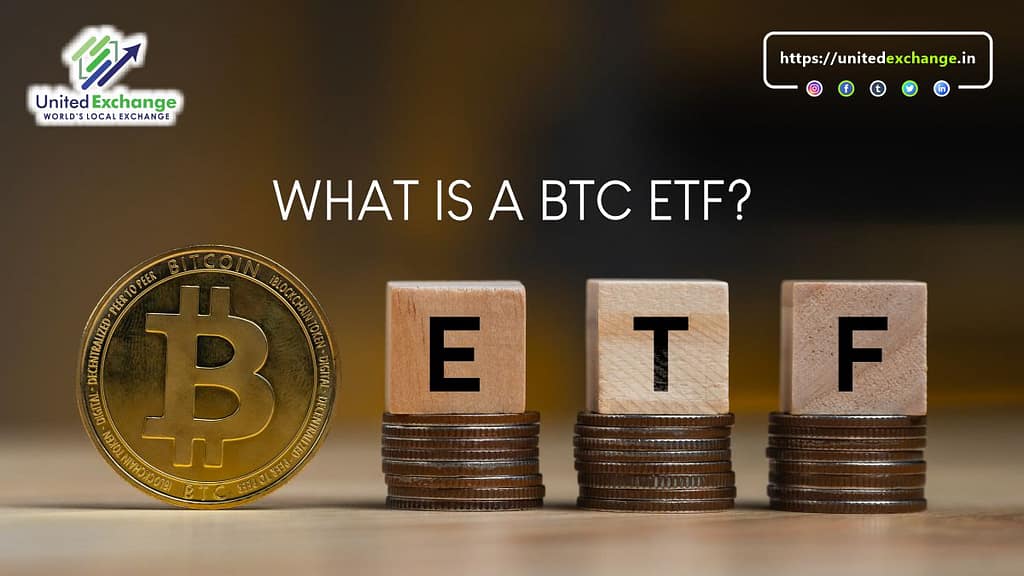Introduction
Bitcoin has been a buzzword in the financial world for over a decade now. As the pioneer of cryptocurrencies, Bitcoin introduced a revolutionary way of thinking about money, transactions, and financial independence. On the other hand, ETFs, or Exchange-Traded Funds, have been a staple in traditional investing, offering a way to invest in a basket of assets. But what unfolds when these two universes meet? Enter the Bitcoin ETF.
What is Bitcoin?
Bitcoin is a decentralized digital currency, was introduced in 2009 by an anonymous figure using the pseudonym Satoshi Nakamoto. Unlike traditional currencies, Bitcoin operates on a peer-to-peer network without a central authority, making transactions faster, cheaper, and more transparent.
How Bitcoin Works
A public ledger known as the blockchain keeps a record of all Bitcoin transactions. This blockchain is maintained by a network of nodes, and each transaction is verified through a process called mining. Miners solve complex mathematical problems to add new transactions to the blockchain, earning Bitcoin as a reward.
Understanding ETFs
An Exchange-Traded Fund (ETF) functions as an investment fund that trades on stock exchanges, just like shares of a company. ETFs hold assets such as stocks, commodities, or bonds, and they generally track an index.
Types of ETFs
There are various types of ETFs, including:
- Equity ETFs: Track stocks
- Bond ETFs: Track bonds
- Commodity ETFs: Track commodities like gold or oil
- Sector and Industry ETFs: Focus on specific sectors or industries
The Concept of Bitcoin ETF
A Bitcoin ETF is a type of investment fund that mirrors the price movements of Bitcoin and is available for trading on a stock exchange. This provides investors with an opportunity to invest in Bitcoin without the hassle of directly purchasing, storing, or securing the cryptocurrency.
How a Bitcoin ETF Works
A Bitcoin ETF would hold Bitcoin or Bitcoin futures contracts. The price of the ETF would track the price of Bitcoin, allowing investors to buy shares of the ETF just like they would with any other stock.
History of Bitcoin ETFs
The journey of Bitcoin ETFs has been a rocky one. The first proposals for Bitcoin ETFs were submitted in 2013, but they faced numerous rejections from regulatory bodies like the SEC. However, over time, the landscape has changed, and several Bitcoin ETFs have now been approved, marking significant milestones in the integration of cryptocurrencies with traditional finance.
Benefits of Bitcoin ETFs
Accessibility for Investors
Bitcoin ETFs provide an easy entry point for investors who want exposure to Bitcoin without needing to navigate the complexities of cryptocurrency exchanges and wallets.
Diversification of Portfolios
By including Bitcoin ETFs in their portfolios, investors can diversify their assets, reducing risk and potentially increasing returns.
Enhanced Security and Regulation
ETFs are regulated financial products, providing an added layer of security and peace of mind for investors who might be wary of the unregulated nature of direct cryptocurrency investments.
Risks and Challenges of Bitcoin ETFs
Market Volatility
Bitcoin is known for its extreme volatility. This can translate to significant price fluctuations in Bitcoin ETFs, making them a risky investment.
Regulatory Concerns
Regulations surrounding cryptocurrencies and Bitcoin ETFs are still evolving. This uncertain regulatory environment can pose risks for investors.
Potential for Manipulation
The cryptocurrency market has been susceptible to manipulation, and this risk extends to Bitcoin ETFs as well.
How to Invest in a Bitcoin ETF
Steps to Get Started
- Research: Understand what Bitcoin ETFs are and how they work.
- Choose a Broker: Select a brokerage platform that offers Bitcoin ETFs.
- Open an Account: Create and fund your brokerage account.
- Select an ETF: Choose the Bitcoin ETF that aligns with your investment goals.
- Invest: Buy shares of the Bitcoin ETF.
The Impact of Bitcoin ETFs on the Crypto Market
Market Trends and Movements
Bitcoin ETFs can influence the overall cryptocurrency market by attracting institutional investors and providing a level of legitimacy to the asset class.
Influence on Bitcoin’s Price
The introduction of Bitcoin ETFs has the potential to drive up the price of Bitcoin by increasing demand and providing easier access to the asset.
Regulatory Landscape for Bitcoin ETFs
Key Regulatory Bodies
In the United States, the SEC (Securities and Exchange Commission) is the primary regulatory body overseeing Bitcoin ETFs. Other countries have their own regulatory authorities.
Recent Regulatory Developments
Recent approvals of Bitcoin ETFs signal a growing acceptance and integration of cryptocurrencies into mainstream finance. However, the regulatory environment remains dynamic and subject to change.
Conclusion
Bitcoin ETFs represent a significant advancement in the financial world, merging the innovative nature of cryptocurrencies with the established framework of traditional investing. While they come with their own set of risks and challenges, the benefits of accessibility, diversification, and enhanced security make them an attractive option for many investors. As the regulatory landscape evolves and more products enter the market, Bitcoin ETFs are likely to play a crucial role in the future of investing.
FAQs
What distinguishes Bitcoin from a Bitcoin ETF?
Bitcoin is a digital cryptocurrency, while a Bitcoin ETF is a financial product that tracks the price of Bitcoin and is traded on stock exchanges.
How can I buy a Bitcoin ETF?
You can buy a Bitcoin ETF through a brokerage platform that offers ETFs. Open an account, fund it, and purchase shares of the Bitcoin ETF.
Are Bitcoin ETFs safe?
Bitcoin ETFs are regulated financial products, which can offer more security compared to directly holding Bitcoin. Despite this, they are still exposed to market risks.
What are the advantages of investing in a Bitcoin ETF over direct Bitcoin investment?
Investing in a Bitcoin ETF provides easier access, regulatory oversight, and avoids the complexities of buying, storing, and securing Bitcoin directly.
How do Bitcoin ETFs affect the overall market?
Bitcoin ETFs can drive market trends by attracting institutional investors and providing legitimacy to cryptocurrencies, potentially influencing Bitcoin’s price and overall market dynamics.
